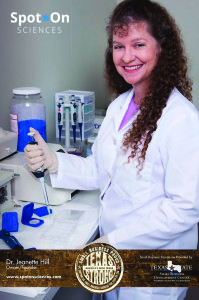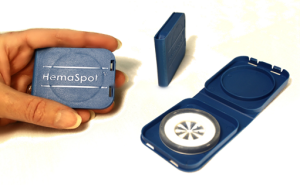By SUSAN LAHEY
Reporter with Silicon Hills News
 The most remarkable thing to Dr. Jeanette Hill about the evolution of her company, Spot on Sciences, is the myriad ways her blood collection device, HemaSpot, is being used. It has proven invaluable in research being done in Spain that shows taking blood pressure medication at night rather than in the morning can mean the difference between life and death. It is being used to collect blood samples from Himalayan snow leopards, to check blood among people with diabetes in the Scottish Isles and for AIDS testing in remote parts of Africa.
The most remarkable thing to Dr. Jeanette Hill about the evolution of her company, Spot on Sciences, is the myriad ways her blood collection device, HemaSpot, is being used. It has proven invaluable in research being done in Spain that shows taking blood pressure medication at night rather than in the morning can mean the difference between life and death. It is being used to collect blood samples from Himalayan snow leopards, to check blood among people with diabetes in the Scottish Isles and for AIDS testing in remote parts of Africa.
While Hill’s team is focused on the device itself, making it as practical and responsive to researcher’s needs as possible, scientists all over the world are discovering HemaSpot and asking whether they can use the device in their research. “I’m almost weekly surprised by someone wanting to use it for medical research, different tests that are taking place all around the world,” Hill said. “It’s surprising and exhilarating.”
Taking blood samples has always been messy and fraught with potential for contamination. It also creates a big problem for people like Hill’s mother who lives 20 miles from the nearest clinic.
“It’s such a burden for her to go in and get her blood tested,” Hill said. “It’s such a hassle to drive all that way…then the labs are only open during certain hours, and she feels lousy for days afterward. I thought isn’t there a better way to do this?” For decades, hospitals have used dried blood sampling to collect blood from newborns requiring only a small stick in the heel and then preserving blood on filter paper. Hill wondered whether she could use the same technique for adults. But that presented problems. Even with trained nurses taking the samples, there was a 20 percent rejection rate. It took hours for the sample to dry—longer if the weather was rainy. And while the paper was exposed to the air it was also exposed to numerous contaminants.
Hill began to work on HemaSpot, a small, plastic container in which sits a “flower” made of filter paper. The device comes with a lancet and alcohol wipes for cleaning the finger for a blood sample. The device only needs three drops of blood. Once the blood dries, researchers can perform up to 50 different experiments just by taking a tiny punch from the paper.
Hill is a rare combination of a research scientist and businesswoman. She received her Ph.D. in bio-organic chemistry from Washington University in St. Louis and did post-doctoral research in auto-immune diseases at Washington Medical Center. While in grad school, she founded Biochemical Resources, an Internet database source for research products and chemicals. It lasted a couple years and was beginning to get traction until the World Wide Web and companies such as Lycos and Yahoo came along and “did it a lot better.”
Afterward, she worked as a director for various small companies. She loved the variety and “chaos” of working for a small company, but when her last employer was bought by a larger company, she decided that was the time to go out on her own.
“We started in February of 2010 with just an idea,” Hill said. “By the end of that year, we had a prototype and some models. It took us another year to get our manufacturer.” Every time they ran up against a problem, like uneven blood flow over the filter paper, which would alter test results, Hill said, they thought “We can fix that.”
“That’s kind of cool,” she said. “This is an opportunity for us to make that a lot better….how can we make that very easy to use, a simple device where you understand immediately how to use it?”
They’ve been through a dozen iterations. Her biggest breakthrough, she said, was creating a design with eight blades fanning out so that the blood would flow evenly to all parts of the paper. With HemaSpot, each part of the paper has identical amounts of blood.
“Whenever you get a roadblock you either go around it or pivot and go the other direction, sometimes a couple times a day.” Hill said. “It’s my personality do a lot of different things…I don’t like where there’s a very narrow path and have to get permission to do things, and sometimes many layers of permission.”
 Ironically though, with any medical device, there are many layers of permission. Currently, the device is only approved for medical research through laboratories. Hill would love to see it available on the shelves for people like her mother, but getting devices approved as diagnostic tools in the U.S. is a lengthy process. It’s moving faster in Europe.
Ironically though, with any medical device, there are many layers of permission. Currently, the device is only approved for medical research through laboratories. Hill would love to see it available on the shelves for people like her mother, but getting devices approved as diagnostic tools in the U.S. is a lengthy process. It’s moving faster in Europe.
In the meantime, HemaSpot is enabling scientific breakthroughs.
Dr. Michael Smolensky is one of the world’s foremost experts in chronobiology—natural physiological rhythms such as circadian rhythms–and always wanted to understand better how to apply them to medical conditions. “I’ve been frustrated because I know that certain constituents of the blood that are important inaccurate medical diagnoses show very great predictability. They reach peak levels or lowest levels at times when appointments can’t be scheduled, and blood can’t be withdrawn. There was not means of getting blood samples from patients at those particular times of the day or night when they would be most valuable in getting accurate determination of the value of medical interventions.”
Smolensky has been working with Dr. Ramon Herrera, Director of Bioengineering & Chronobiology Laboratories at the University of Vigo, Spain. They discovered that patients who take their blood pressure medication at night are five times less likely to suffer a heart attack than those who take it in the morning. But they weren’t able to isolate why. They knew there was a change in some levels, such as cortisol, at different times of day. But what else was going on in the interactions between the medications and changes in the blood over a 24-hour period? With HemaSpot, they can get patients with hypertension to take their blood at three-hour intervals from home to look at all the factors.
“One of (Hill’s) strengths is that she is very open minded to criticism about her product designs and development, unlike many other that companies just want to get on the market and see financial flow,” Smolensky said. “She’s just very inquisitive and open minded, not a typical business personality. She certainly has the business acumen, but she’s also very science oriented.” And as a person, he said, Hill is “just delightful.”
Most of Spot on Science’s funding has come from the Defense Advanced Research Projects Agency Small Business Innovation Research Program. Their phase II grant was for $1.5 million, and they recently received an additional $750,000. Hill has been pitching—and winning pitch competitions—since she joined Avinde accelerator for women entrepreneurs building scalable businesses.
“I had done a lot of talks but scientific talks,” Hill said. “The very first time I got up to pitch I was so nervous. It wasn’t a very good talk at all. I had just developed the company and came up with a name for it which was Spot on Biosciences. Someone said ‘You’re going to want to shorten that name. For one thing, it’s too long. For another, you don’t want to be the S.O.B. company.”
Hill did a lot of things right from the beginning, said Terry Chase Hazell, director of emerging tech at Avinde. “She made a clean break from her employer, protecting her IP, built a great team, she’s fully participating in the entrepreneurship scene and most importantly she picked a business model that could scale.”
Right now, Hill said, HemaSpot is being used in pilot studies but they’ll need to hit a certain critical mass to scale up. A study starts with a few patients. Once it’s determined that the device works, a research project increases that to 100 patients, 1,000 patients, 10,000…once it hits 100,000, Hill said, it will be time to scale up. She’s building relationships now to determine who would be a good investment partner for Spot on Sciences.
But what brings her to work every day, Hill said, isn’t growing the company. “We can see that this can make a difference in the world. This is going to change the way we do blood tests. This is going to advance clinical science. That’s what I love to hear.”
Editor’s note: This story first appeared in Silicon Hills News’ print magazine on the Life Sciences industry
